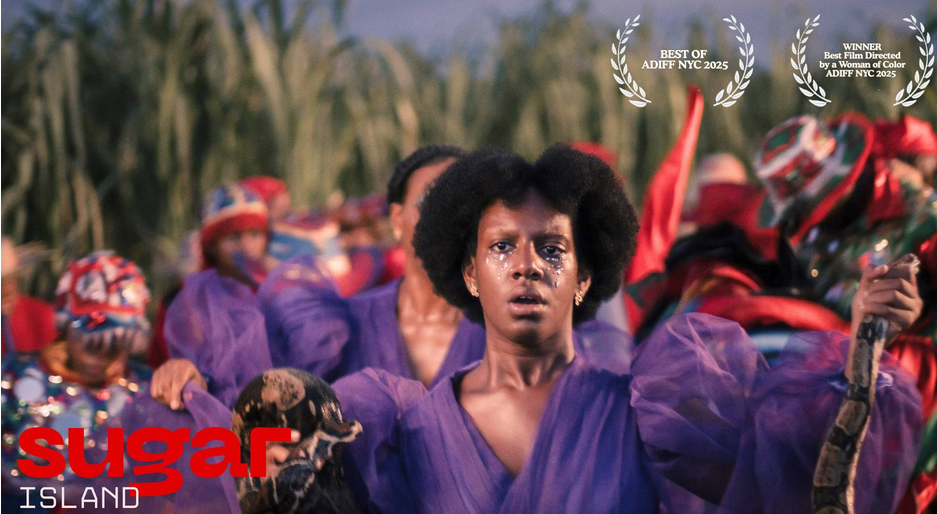By Paulo Mileno
Photos:Paulo Mileno
Exu is an African God responsible for communication between the sky (Orún) and earth (Ayê). This red drum was of Red Hot Chili Perper’s band
“Esú killed the bird yesterday with the stone that he threw today”
(Nagô aphorism)
The rhythmic synergy of African drums and poetry takes center stage in Tamborism: Drum and Poetry, a groundbreaking project led by Nelson Maca. He brings contemporary artistic with ancestral resonance, the show exemplifies the vibrancy of Afro-diasporic culture.
Nelson Maca describes Tamborism as, “a poetic exploration in dialogue with Afro-diasporic rhythms. It contrasts the African drum’s vibrancy with the hegemony of the lyre, creating a dynamic interplay of Drumming Poem, Ijexá Poem, Reggae Poem, Dub Poem, and Funk Carioca Poem”.
Joined by renowned percussionist Master Jorjão Bafafé, Maca’s performances seamlessly blend original poetry with pulsating beats.Their work transitions between celebrating Black beauty and confronting the reality of Black genocide. Together, they honor forgotten Black poets and harness musicality to evoke ancestral energy, reshaping Brazil’s cultural future—a nation historically built by Black hands.
Thus, Tamborism becomes a celebration of Blackness, Africanness, and polyrhythms through drums and poetry, aspiring to create a stronger global impact.

Paulo Mileno and Nelson Maca
The Collaborative Spirit
Nelson Maca, a cultural producer, poet, and activist, invited Master Jorjão Bafafé to join the project, whose illustrious career includes collaborations with Margareth Menezes, the Ministry of Culture in Brazil he also founded the Afoxé Badauê and was a former percussionist of the Araketu, a renowned Afro-Brazilian group.

Paulo Mileno and Master Jorjão Bafafé
Tamborism’s magnetic performances have captivated audiences in Bahia and Rio de Janeiro. During a show in Rio’s artistic neighborhood of Santa Teresa, actress and activist Vera Lopes made a special appearance. Founder of the theatrical group Black Box, Lopes has earned awards and recognition for her career.
Mrs. Vera Lopes is a beautiful Black woman and also she is the mother of Quênia Lopes de Moraes, a hairstylist at TV Rede Globo (the biggest broadcasting in Latin America) and Camila Lopes de Moraes, a filmmaker who made history in Brazilian cinema with her film The Man of the Wrong Case (2017), as the second Black woman to release a commercial film in Brazil. The film was even included in the preliminary Oscar list.

Actress Vera Lopes and Master Jorjão Bafafé on stage

Paulo Mileno between Vera Lopes and Quênia Lopes de Moraes
Nagô Thinking: Philosophy in Rhythm

Book Nagô Thinking by Muniz Sodré
When I saw this show in Santa Teresa. firstly, I thought in book ‘Nagô thinking’ by teacher Muniz Sodré because the project invites us to embrace Nagô thinking as a way to reconnect with African heritage.
Nagô Thinking represents a philosophy that values the superpower of creative capacity, resilience, and asé (vital energy). Whether it’s building a home, creating something new, or raising children, the focus is on revolutionary praxis and continuity.
This form of thought, which predates Christianity by millennia in Africa, travels and evolves in Brazil, becoming a spatial metaphor for Diaspora philosophy.
Sodré describes this philosophy as “a way of thinking to the beat of the drum, beyond the confines of the head.” It incorporates tools like oracles and shell divination to guide thought and action, embodying the adaptability of African cultural practices. These traditions have been preserved through Brazil’s terreiros, which serve as sanctuaries of civilizational resignification.
A Legacy of Resistance
Historically, Brazil’s Quilombos symbolized freedom and resistance against slavery.
But, while the Quilombos no longer hold the same military or economic power, the Terreiros were and still are sanctuaries of civilizational resignification.These Ancestral homes uphold their legacy as African kingdoms like Congo, Ndongo, Oyo, and Dahomey.
Nations like Congo, Angola, Ijexá, Ketu, Efon, and Jeje honor and reinterpret these legacies in their practices because the Black gods and majesties live on through Brazil’s African religious traditions.
As scholar Molefi Kete Asante observed:
“Slaves are not born. Slaves are made. But how you make slaves? You make a slaves by creating a lost memory. If you create a lost memory and create a Historical amnesia, then it becomes possible for individuals, don’t more remember and when they don’t more remember to who are connected, their owns traditions, they are following any traditions”.
Walking through Saara, a bustling commercial area in Rio managed predominantly by Lebanese and Syrian immigrants, actress Vera Lopes reflected on the enduring scars of slavery. She highlighted the contrast between those who rely on force and those who rely on thought.
Lopes also emphasized a troubling trend: White artists often draw inspiration from African culture, while many Afro-descendants hesitate to embrace their own heritage. Tamborism confronts this disparity, offering a path to reclaim identity and celebrate cultural richness.
Tamborism: Drum and Poetry is more than a performance—it’s a movement. By harmonizing the power of drums and poetry, the project inspires audiences to reconnect with their roots, challenge historical narratives, and envision a future grounded in ancestral strength and unity.
In contrast, the African drum’s presence in North America has often been muted, and for this reason, now we have an opportunity to reconnect with the mystic rhythms that have long been central to our heritage.
Unfortunately, many Afro-Brazilians have been miseducated, leading to fear or shame about their culture.
Yet, the drum serves as a unifying symbol, connecting Yoruba and Bantu cultural legacies in Brazil and resonating across the African Diaspora in South America and the Caribbean.
Through its cultural revival, Nelson Maca and Master Jorjão Bafafé honor the past, energize the present, and build a transformative legacy for generations to come.
Paulo Mileno is an actor, filmmaker, cultural producer, writer, editorial advisor of Africa and Africanities Magazine and he was a researcher in the Nucleus of African Philosophy at the State University of Rio de Janeiro (Brazil). Mileno also contributes to Observatório da Imprensa (São Paulo – Brazil), Brasil de Fato (São Paulo – Brazil), Jornal do Brasil (Rio de Janeiro – Brazil), Black History Month (London – England), Ufahamu: A Journal of Black Studies from Los Angeles University -UCLA (Los Angeles – USA), San Francisco National Black Newspaper (San Francisco – USA), Black Star News (New York – USA), New York Amsterdam News (New York – USA) and Africa Business (Cape Town – South Africa). Reach him via [email protected]








